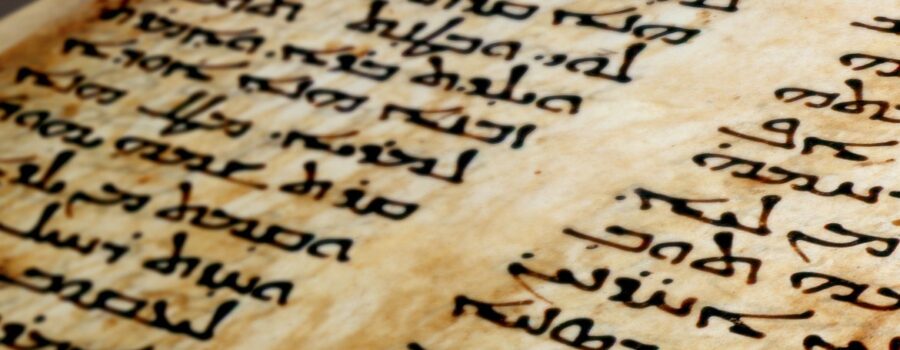One of the criticisms leveled against The Stick of Joseph is that it contains material very similar to parts of the New Testament from the King James Version of the Bible. And while it is indeed true that New Testament language and ideas are found throughout the Stick of Joseph, critics have painted with an overly broad brush in attempting to use this fact as evidence of plagiarism. A full treatment of the topic would take volumes, but for today’s post we’ll delve into just one interesting example.
In the Stick of Joseph, we find four instances of passages containing variations of the New Testament phrase, “drinks damnation”:
But O my people, beware lest there shall arise contentions among you, and you hearken to obey the evil spirit which was spoken of by my father, Moshiyah. For behold, there is a woe pronounced upon him who hearkens to obey that spirit; for if he hearkens to obey him, and remains and dies in his sins, the same drinks damnation to his own soul, for he receives for his wages an Everlasting punishment, having transgressed the Torah of Elohim, contrary to his own knowledge. (Moshiyah 1:10)
And the infant perishes not that dies in his infancy, but men drink damnation to their own souls except they humble themselves, and become as little children, and believe that salvation was, and is, and is to come, in and through the atoning blood of Mashiach, YHWH Omnipotent. (Moshiyah 1:16)
They shall stand as a bright testimony against this people at the judgment day, whereof they shall be judged, every man according to his works, whether they be good or whether they be evil. And if they be evil, they are consigned to an awful view of their own guilt and abominations, which does cause them to shrink from the presence of YHWH into a state of misery and Endless torment, from which they can no more return. Therefore, they have drunk damnation to their own souls. Therefore, they have drunk out of the cup of the wrath of Elohim, which justice could no more deny unto them than it could deny that Adam should fall because of his partaking of the forbidden fruit. (Moshiyah 1:18)
For whoever eats and drinks my flesh and blood unworthily eats and drinks damnation to his soul; therefore, if you know that a man is unworthy to eat and drink of my flesh and blood, you shall forbid him (3 Nefi 8:9)
The Stick of Joseph has been accused of plagiarizing this phrase from 1 Corinthians 11:29, where the KJV reads:
27 Wherefore whosoever shall eat this bread, and drink this cup of the Lord, unworthily, shall be guilty of the body and blood of the Lord.
28 But let a man examine himself, and so let him eat of that bread, and drink of that cup.
29 For he that eateth and drinketh unworthily, eateth and drinketh damnation to himself, not discerning the Lord’s body. (1 Corinthians 11:27-29 KJV)
The English phrase “and drinks damnation to himself” is a literal translation of the Greek ἐσθίων καὶ πίνων κρίμα ἑαυτῷ
However, the Stick of Joseph version differs in an important way. Rather than “eats and drinks damnation to himself” as we read in the KJV and in the Greek, the Stick of Joseph has “eats and drinks damnation to his soul” This is very interesting because the Aramaic Peshitta text of the same passage has: חויבא הו לנפשה אכל ושתא literally “damnation he, to his soul, eats and drinks.” Therefore, the Stick of Joseph precisely matches the phrasing from the Aramaic Peshitta, not the Greek New Testament (or the KJV).
The fact that the Stick of Joseph matches the Aramaic Peshitta is especially important because of scholarly controversy surrounding the original language of the New Testament. Though the commonly accepted belief is that the New Testament was originally written in Koine Greek, a growing body of evidence indicates the Greek was actually a translation from the original writings, which were in the semitic languages of Hebrew and/or Aramaic. Some have additionally argued that the Aramaic Peshitta New Testament descends from that original Aramaic textual tradition and represents an older and more authentic text.
For example Dr. Karen Tourne Masterson, who has a Ph.D. from UCLA in Near Eastern Languages, has written:
The argument that Paul is a Hellenistic Jew because many of the quotes that appear in the Greek version of the Old Testament are from the Septuagint is inadequate. If his writings were originally written in Aramaic, his native language, the translator would not translate the Old Testament himself, but would use the version that was most familiar to his readers (the same approach is used today in translations). The evidence from God’s Word causes us to take issue with the tradition which contends that Paul wrote in Greek. Knowing that Aramaic was his native tongue should prompt us to consider the language of an Aramaic original which lies behind the Greek and other versions to which we have access today.
(An Aramaic Approach to the Church Epistles; The Way Magazine; March-April 1984 pages 17-20)
And Aramaic scholar Daniel McConaughy wrote:
“God’s Word itself does not explicitly identify the language in which the New Testament was written, but it does provide information that indicates what the original language was. This information can be further augmented by historical facts known about Israel and its culture during the Testament era, as well as by the earliest non-Biblical writings about the early Church. Both the Biblical evidence, which is primary, and the church historical evidence strongly indicate that the original language of the New Testament was Aramaic. …
Knowing that the New Testament writers wrote in Aramaic, not Greek, opens up new vistas of understanding and research. Primarily, this knowledge further enables the Biblical researcher to see that the Bible is not a compendium of random written and oral sources. Rather, it is the Word of God, revealed to men who recorded that revelation in the native Aramaic and later oversaw its translation into Greek, Latin, and Syriac; and it is with the descendants of these first translation endeavors that today’s Biblical researcher must work.”
(The Aramaic Origin of the New Testament; The Way Magazine; May-June 1985 pages 17-20)
McConaughy is former Coordinator of the Biblical Research Department at the Way College of Emporia. He discovered a previously lost page of the Old Syriac Curetonian manuscript of the Gospels, and has been published in at least two academic journals. (“A Recently Discovered Folio of the Old Syriac (Sy(c)) Text of Luke 16,13-17,1”; Biblica Vol. 68- Fasc. 1- 1987; pp. 85-90. and “An Old Syriac Reading of Acts 1:4 and More Light on Jesus’ Last Meal before His Ascension”; Oriens Christianus; Band 72 1988; pp. 63-67).
Finally native Aramaic speaker and Peshitta scholar George M. Lamsa wrote:
The Pauline Epistles were letters written by Paul to small Christian congregations in Asia Minor, Greece and Rome. These early Christians were mostly Jews of the Dispersion, men and women of Hebrew origin. Paul on his journeys always spoke in the Jewish synagogues. His first converts were Hebrews. Then came Arameans… Paul emphasizes Hebrew law and history. He refers to Abraham, Isaac, and Jacob as our fathers. In his letters and teaching he appeals to the Jewish people to accept Jesus as the promised Messiah. Paul’s mission was first to his own people… Paul was educated in Jewish law in Jerusalem. He was a member of the Jewish Council. His native language was western Aramaic but he acquired his education through Hebrew and Chaldean or Palestinian Aramaic… He defended himself when on trial in the Hebrew tongue. Acts 22:2… Very early the Epistles were translated into Greek for the use of converts who spoke Greek. Later they were translated into all tongues.
(George M. Lamsa; The New Testament according to the Eastern Text; 1940; pp. xi-xii)
So this Stick of Joseph parallel to 1 Corinthians 11:29 agrees not with the KJV, or even with the underlying Greek text, but with the Aramaic Peshitta text of 1 Corinthians 11:29—a text many scholars argue is part of an Aramaic textual tradition that is more original than the Greek version! Yet in 1830 the Peshitta had not yet been translated into English, and therefore Yosef ben Yosef could not possibly have known that the more original Aramaic reading of 1 Corinthians 11:29 had “his soul” in this verse!
The fact that the Stick of Joseph contains language and concepts similar to those found in the New Testament is not the smoking gun critics think it is. The original Gospel of the Messiah was taught and recorded in biblical lands, and similarly taught and recorded in the Stick of Joseph lands in the Western Hemisphere. The ideas come from the same divine source, and the potentially oldest versions of Biblical manuscripts support the assertion that the Stick of Joseph is authentic, ancient and divine.






Leave a Reply